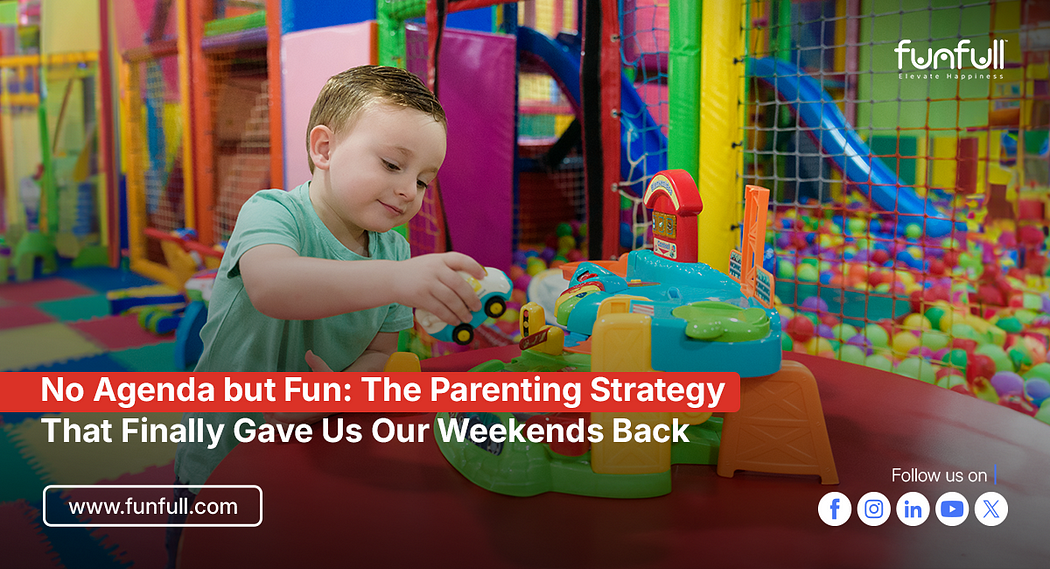No Agenda but Fun: The Parenting Strategy That Finally Gave Us Our Weekends Back - Fun places near you

Why Structured Weekends Were Failing Families (Fun places near you)
For many parents, weekends became an exhausting continuation of weekday patterns. Structured playdates, sports, enrichment classes, and tightly packed schedules were supposed to bring balance and joy. Instead, they often created more rush, more tension, and a quieter kind of emotional fatigue.
Instead of feeling recharged, families found themselves running on empty by Sunday night.
Children melted down.
Parents snapped faster.
And the activities that were meant to build memories started feeling like obligations.
It wasn’t the effort that was wrong — it was the expectation. Families were trying to orchestrate a connection instead of allowing it to happen.
The reset didn’t come from filling the weekends with more. It came from pulling back the structure and committing to a different goal altogether: no agenda but fun.
What Happens When Fun Becomes the Only Agenda
Removing the agenda doesn’t mean eliminating intention. It simply means shifting the purpose of the time together.
Instead of:
- Finishing the to-do list
- Checking boxes of activities
- Creating curated Instagram-worthy outings
The priority becomes:
- Laughing
- Moving
- Connecting
- Exploring whatever feels right in the moment
This shift immediately changes the emotional tone of the weekend. Kids feel it first.
Without the pressure of “hurry up” or “let’s stay on track,” their natural curiosity reappears.
They explore more. Argue less. Invite parents into their world with less defensiveness.
And the relationship dynamic softens because the invisible expectation to “perform family time correctly” disappears.
Parents feel it too. Without a mental clock ticking in the background, patience stretches.
Instead of directing the day, you start following it.
Instead of finishing a schedule, you complete experiences.
How to Build a Fun-First Weekend (Without Chaos)
Abandoning structure doesn’t mean embracing disorder. A weekend built on fun-first flow still benefits from a light, flexible framework. It’s not about doing nothing. It’s about letting connection lead the timing, not the clock.
Here’s how to create a sustainable no-agenda weekend rhythm:
1. Protect Time, Not Tasks
Choose time windows where nothing formal is planned.
For example, Saturday from 9 a.m. to noon is simply “family together time.” No errands, no sports, no lessons. It’s free to unfold.
2. Offer Options, Not Schedules
Have a few ideas ready if needed:
- Walks to a new playground
- Water balloon battles
- Visiting a family fun center for open play
- Art stations or backyard obstacle courses
But don’t assign them. Let energy guide the choice.
3. Stay Open to Unexpected Flow
If the morning was supposed to be an outdoor hike but it rains? Stay in and build a giant blanket fort.
If the plan was to visit a new museum but everyone wants to stay in pajamas and bake cookies? Adjust without regret.
Sometimes the best family play day moments happen when the plan dissolves.
4. Close the Day with Calm, Not a Checklist
End the day gently — with a slow dinner, a shared movie, or even a pile of books on the couch.
The closing matters more than completing a list. It signals that the day was enough.

The Ripple Effects Throughout the Week
Families who reclaim their weekends this way start seeing deeper shifts that extend far beyond Saturday and Sunday.
- Children’s emotional regulation improves.
When weekends aren’t filled with constant transitions, kids arrive at Monday more emotionally available for school, chores, and structured activities. - Parent-child relationships soften.
When children don’t feel rushed or managed in every interaction, fewer fights, more shared jokes, and a greater willingness to cooperate emerge. - Siblings cooperate more naturally.
With more room for spontaneous shared play, siblings have more opportunities to build their own rhythms without constant refereeing. - Weekday stress lowers.
Parents stop dreading the weekend and start seeing it as a genuine emotional reset — one that recharges them for real life instead of draining them further.
When weekends are protected for emotional freedom, the impact ripples outward.
The whole family benefits — not just from what was done, but from what was allowed.
Final Thought: Replacing Achievement with Aliveness
Parents are often taught — explicitly or subtly — that a “good” weekend is a productive one.
Full days, posted pictures, proud checklists.
But for children, and frankly for exhausted parents too, the weekends that stay in the memory aren’t the ones that checked the most boxes.
They’re the ones that flowed without force.
A morning spent bouncing at a family fun center, a muddy hike turned spontaneous, a backyard picnic where the snacks were made up on the spot — those are the experiences that build real connection.
You don’t need a stacked schedule.
You don’t need perfect plans.
You need space for fun to happen without a script.
When you build your weekends around that space, you don’t just get more time — you get your family back.
Visit for more out website “Funfull”

Comments
Post a Comment